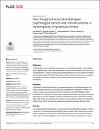The strength of association between psychological factors and clinical outcome in tendinopathy: A systematic review
| Author | Stubbs, Carl |
| Author | Mc Auliffe, Sean |
| Author | Mallows, Adrian |
| Author | O'sullivan, Kieran |
| Author | Haines, Terence |
| Author | Malliaras, Peter |
| Available date | 2023-09-20T08:47:10Z |
| Publication Date | 2020 |
| Publication Name | PLoS ONE |
| Resource | Scopus |
| ISSN | 19326203 |
| Abstract | Objective Tendinopathy is often a disabling, and persistent musculoskeletal disorder. Psychological factors appear to play a role in the perpetuation of symptoms and influence recovery in musculoskeletal pain. To date, the impact of psychological factors on clinical outcome in tendinopathy remains unclear. Therefore, the purpose of this systematic review was to investigate the strength of association between psychological factors and clinical outcome in tendinopathy. Methods A systematic review of the literature and qualitative synthesis of published trials was conducted. Electronic searches of ovid MEDLINE, ovid EMBASE, PsychINFO, CINAHL and Cochrane Library was undertaken from their inception to June 2020. Eligibility criteria included RCT's and studies of observational design incorporating measurements of psychological factors and pain, disability and physical functional outcomes in people with tendinopathy. Risk of Bias was assessed by two authors using a modified version of the Newcastle Ottawa Scale. High or low certainty evidence was examined using the GRADE criteria. Results Ten studies of observational design (6-cross sectional and 4 prospective studies), involving a sample of 719 participants with tendinopathy were included. Risk of bias for the included studies ranged from 12/21 to 21/21. Cross-sectional studies of low to very low level of certainty evidence revealed significant weak to moderate strength of association (r = 0.24 to 0.53) between psychological factors and clinical outcomes. Prospective baseline data of very low certainty evidence showed weak strength of association between psychological factors and clinical outcome. However, prospective studies were inconsistent in showing a predictive relationship between baseline psychological factors on long-term outcome. Cross sectional studies report similar strengths of association between psychological factors and clinical outcomes in tendinopathy to those found in other musculoskeletal conditions. Conclusion The overall body of the evidence after applying the GRADE criteria was low to very low certainty evidence, due to risk of bias, imprecision and indirectness found across included studies. Future, high quality longitudinal cohort studies are required to investigate the predictive value of baseline psychological factors on long-term clinical outcome. |
| Language | en |
| Publisher | Public Library of Science |
| Subject | Coping Behavior Acceptance and Commitment Therapy Chronic Pain |
| Type | Article Review |
| Issue Number | 11-Dec |
| Volume Number | 15 |
Files in this item
This item appears in the following Collection(s)
-
Physical Therapy & Rehabilitation [88 items ]


